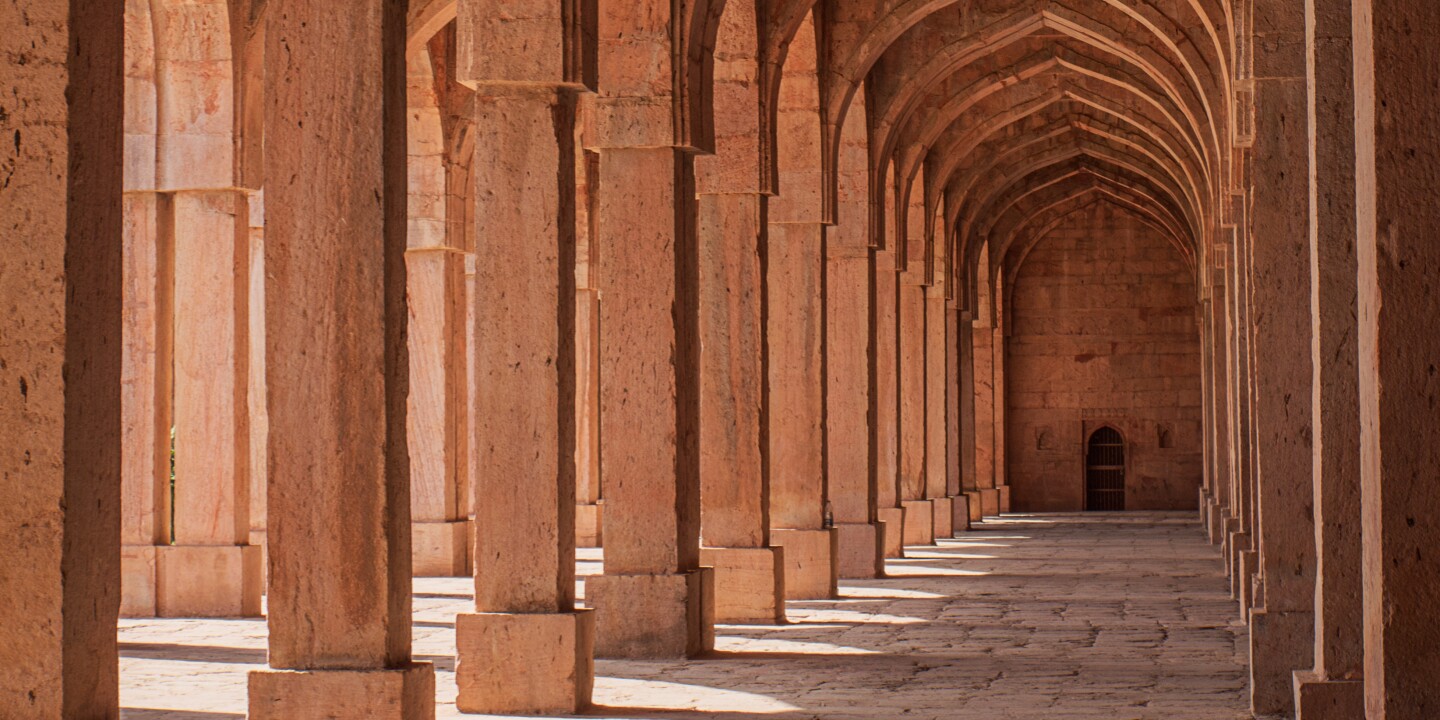In the walled city of Old Delhi, the erstwhile capital of the Mughal empire, old mansions, mosques, and tombs abut modern-day bridal shops and KFCs. The effect is dizzying.
But Old Delhi also offers an alternative history of the city—one that Iqbal Ali, a trans nonbinary Muslim, is trying to bring to light: Since 2022, Ali has been offering queer heritage walks infused with stories of love, poetry, and street food. The idea was sparked in 2015, when Ali went on a similar walk in Manila, Philippines.
Initially, Ali collaborated with queer collectives in Delhi for trial walks and then began posting about the tours on Instagram. An English honors dropout from an undergraduate course, Ali has a penchant for food and languages: They have taken several culinary courses, cofounded Delhi’s first queer café, and assisted foreign doctoral students with research on Indian history and society. One afternoon, dressed in a kurta with denim jeans and sunglasses, Ali gathers a group of 10 people—tourists, students, a lawyer, and a yoga therapist—to bring us to several sites across Old Delhi.
Our first stop is Sunehri Masjid, or Golden Mosque. A red sandstone building amid old neem and sheesham trees, the mosque was commissioned in the 18th century by Javed Khan, a transgender person who was an ally of Emperor Muhammad Shah and helped Queen Qudsiya Begum and her son in ruling after the emperor died. Transgender and intersex persons, known as khwaja sara, were often employed to guard the royal harems in medieval India, and many of them also acted as spies and court advisors.
Ali points to a marble plaque on the mosque bearing Khan’s name in Persian. “This shows the importance given to queer persons during the Mughal period. They could commission mosques and run empires, too,” Ali says. “The British, however, tried to erase these facts during colonial rule.”
I think then of the laws issued by the British against homosexuality and transgender persons and their ripple effects. It wasn’t until 2018 that India’s Supreme Court removed the colonial-era provision debarring “unnatural sex” among consenting adults. Queer people still, however, are denied marriage rights in India.
A few yards from the mosque, Sunday shopping is in full swing. We shoulder our way through the crowds at the flea market and ascend to an island of tranquility—the white marble tomb of India’s first education minister, Maulana Abul Kalam Azad.
A famous freedom fighter, Azad espoused Hindu-Muslim unity and religious tolerance at a time when India was witnessing mayhem leading to its partition in 1947. Azad was deeply inspired by Sarmad Kashani: He translated his poetry and wrote extensively about how the 17th-century Sufi saint’s life was a challenge to tyranny and religious dogma.
Originally a trader from Armenia, Kashani met a Hindu boy, Abhay Chand, during his travel to India’s Sindh province. History of their relationship is debated, but reportedly, Chand’s father and Sindh’s governor tried to separate the two before giving in, and Kashani and Chand moved to Delhi. Eventually, Kashani’s criticism of Emperor Aurangzeb and the clergy led to the royal army beheading him on charges of heresy in 1661.
Still, Ali says, there is something to learn from Kashani. “His life is an answer to those queer people who claim to be apolitical or support the tyrants of present times,” they say. “The rising Islamophobia in Indian society has to be countered, and queer people can’t shy away from extending solidarity to other marginalized groups.”
In 2010, Ali was one of the first queer people to come out on national media. They tout their supportive grandmother, who attended Pride marches and exhorted other parents and grandparents to accept their queer relatives. Three years ago, Ali, who was born in a Sikh family, converted to Islam. “My conversion was a second ‘coming out’ for my family, and finally they are beginning to accept my new religious identity,” Ali says.
The queer heritage walk has been a source of strength for them, especially when college students participate. “Many campus queer collectives have approached me for tours, and it’s great to interact with the younger lot, as they are enthusiastic to know and learn from the past,” they say. Ali also adds that these walks have turned into a platform for LGBTQ people to meet and socialize—all, of course, with a little history and culture.
Old Delhi is particularly famous for its delicacies. We make a pit stop at Ustad Tea Point, which brews a special cup with milk that’s set to boil all day, giving the tea a thick creamy texture. After a brief rest, we walk the 10 minutes to Dariba Kalan, an ancient market of jewelry and perfume. Ali tells the group how khwaja saras used to throng the place to get the latest wares; we chuckle collectively at the idea that queer people—across eras—have been the best sort of fashion influencers.
The walk ends at Old Famous Jalebi Wala, a sweet shop known for its crispy jalebi funnel cake and samosas. Fittingly, the sweet shop is the starting point of something else: After realizing that food can be a facilitator for tough conversations, Ali recently started another initiative called “Queering the Food,” whereby a queer person or ally takes participants on a traditional culinary experience in their neighborhood. Another queer walk Ali offers brings in local transgender guides to talk about how they deal with transphobia, navigate different spaces, and encounter police brutality. On all walks, Ali says, the point is connection and understanding.
“I want to show people that we were always here, not only witnessing the history but also shaping it,” they say. “I also want queer people to find themselves in the past and be as unapologetic about their identities as our ancestors were. These stories and relics counter the claim that queerness is a modern import from the West.”
Iqbal Ali conducts heritage walks on the weekends. Contact them on Instagram or by email at [email protected] to book.











